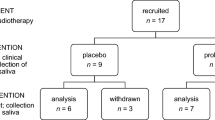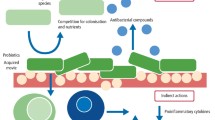Abstract
Data sources Four electronic databases (PubMed, Web of Science, Scopus and PLOS) were queried to identify studies that investigated the effects of probiotics against oral cancer, published in the English language between January 2015 and February 2020.
Study selection Randomised controlled trials (RCT) including in vivo and in vitro studies that evaluated the effects of probiotics against oral cancer were included.
Data extraction and synthesis The Preferred Reporting Items for Systematic Reviews and Meta-Analyses (PRISMA-P) 2015 guidelines were followed to conduct this systematic review. Screening of titles, abstracts and full texts was done independently by four authors with disagreements resolved by mutual discussion. Individual studies' year, author, country, as well as strain of probiotics, type of sample, mechanisms of probiotics and outcomes, were analysed by two authors. The methodological quality of the included studies was assessed using the Joanna Briggs Institute (JBI) Critical Appraisal Tools (Checklist for Randomised Controlled Trial) by three authors. Meta-analysis was performed with Review Manager software, Version 5.3 and results were reported in odds ratio. Inconsistency test (I2) was used to examine the heterogeneity between studies.
Results From an initial 774 articles, only five met the study eligibility criteria to be included in this review. Two studies used in vivo animal models and three studies conducted in vitro experiments using cancer and normal cell lines. There were no studies on humans. Four probiotics were reported to inhibit oral carcinogenesis; namely, Acetobacter syzygii (A. syzygii), Lactobacillus plantarum (L. plantarum), Lactobacillus salivarius (L. salivarius) Ren and AJ2 (combination of Streptococcus thermophiles, Bifidobacterium breve, Bifidobacterium longum, Bifidobacterium infantis, Lactobacillus acidophilus, Lactobacillus plantarum, Lactobacillus casei, Lactobacillus bulgaricus). Two studies that used L. salivarius Ren were combined quantitatively in a meta-analysis which showed 95% reduction of risk in oral cancer development (OR = 0.05, 95% CI 0.01-0.23; p <0.05).
Conclusions Within the limitations of in vivo (animal) and in vitro (cell lines) studies, the authors concluded that the probiotics analysed in this review, especially L. salivarius Ren, seem to play a role in oral cancer inhibition.
This is a preview of subscription content, access via your institution
Access options
Subscribe to this journal
Receive 4 print issues and online access
$259.00 per year
only $64.75 per issue
Buy this article
- Purchase on Springer Link
- Instant access to full article PDF
Prices may be subject to local taxes which are calculated during checkout
Similar content being viewed by others
References
Hill C, Guarner F, Reid G et al. Expert consensus document. The International Scientific Association for Probiotics and Prebiotics consensus statement on the scope and appropriate use of the term probiotic. Nat Rev Gastroenterol Hepatol 2014; 11: 506-514.
Wieërs G, Belkhir L, Enaud R et al. How Probiotics Affect the Microbiota. Front Cell Infect Microbiol 2020; DOI: 10.3389/fcimb.2019.00454.
Stavropoulou E, Bezirtzoglou E. Probiotics in Medicine: A Long Debate. Front Immunol 2020; DOI: 10.3389/fimmu.2020.02192.
Su G L, Ko C W, Bercik P et al. AGA Clinical Practice Guidelines on the Role of Probiotics in the Management of Gastrointestinal Disorders. Gastroenterology 2020; 159: 697-705.
McQuade J L, Daniel C R, Helmink B A, Wargo J A. Modulating the microbiome to improve therapeutic response in cancer. Lancet Oncol 2019; DOI: 10.1016/S1470-2045(18)30952-5.
Hassan H, Rompola M, Glaser A W, Kinsey S E, Phillips R S. Systematic review and meta-analysis investigating the efficacy and safety of probiotics in people with cancer. Support Care Cancer 2018; 26: 2503-2509.
Yu Z K, Xie R L, You R et al. The role of the bacterial microbiome in the treatment of cancer. BMC Cancer 2021; 21: 934.
Suez J, Zmora N, Segal E, Elinav E. The pros, cons, and many unknowns of probiotics. Nat Med 2019; 25: 716-729.
The Lancet Gastroenterology Hepatology. Probiotics: elixir or empty promise? Lancet Gastroenterol Hepatol 2019; 4: 81.
The Lancet Gastroenterology Hepatology. Is the promise of probiotics being fulfilled? Lancet Gastroenterol Hepatol 2020; 5: 711.
International Agency for Research on Cancer. All cancers fact sheet. 2020. Available at https://gco.iarc.fr/today/data/factsheets/cancers/39-All-cancers-fact-sheet.pdf (accessed February 2022).
International Agency for Research on Cancer. Lip and oral cavity fact sheet. 2020. Available at https://gco.iarc.fr/today/data/factsheets/cancers/1-Lip-oral-cavity-fact-sheet.pdf (accessed February 2022).
Zarco M F, Vess T J, Ginsburg G S. The oral microbiome in health and disease and the potential impact on personalized dental medicine. Oral Dis 2012; 18: 109-120.
Author information
Authors and Affiliations
Rights and permissions
About this article
Cite this article
Kumar, S. Can probiotics stop oral cancer progression?. Evid Based Dent 23, 22–23 (2022). https://doi.org/10.1038/s41432-022-0246-y
Received:
Accepted:
Published:
Issue Date:
DOI: https://doi.org/10.1038/s41432-022-0246-y
This article is cited by
-
Chemopreventive role of probiotics against cancer: a comprehensive mechanistic review
Molecular Biology Reports (2023)



